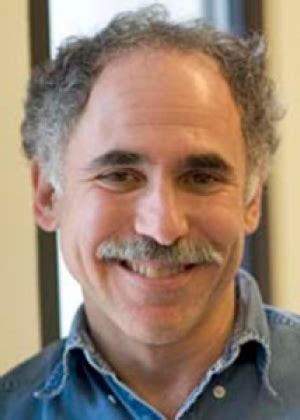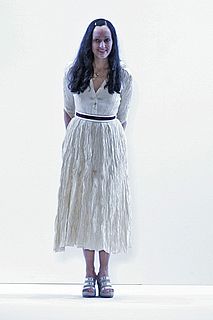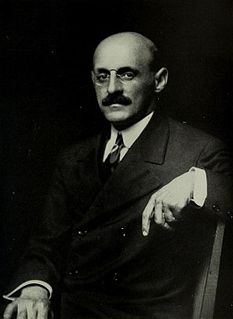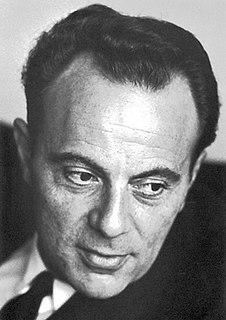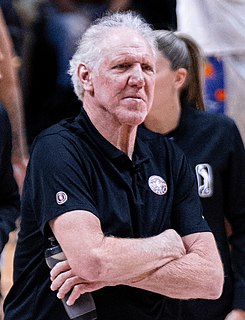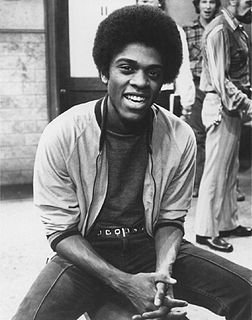Top 274 Experimentation Quotes & Sayings - Page 5
Explore popular Experimentation quotes.
Last updated on April 15, 2025.
A decline in supervision is not the entire story. Even in the fifties there were undersupervised children . . . who nevertheless did not become pregnant at thirteen . . . and who did not smoke anything stronger than an occasional Camel or Lucky Strike. . . . It took a combination of unsupervised children and a permissive, highly charged sexual atmosphere and an influx of easily acquired drugs and the wherewithal to buy them to bring about precocious experimentation by young and younger children. This occurred in the mid-seventies.
The foundations of population genetics were laid chiefly by mathematical deduction from basic premises contained in the works of Mendel and Morgan and their followers. Haldane, Wright, and Fisher are the pioneers of population genetics whose main research equipment was paper and ink rather than microscopes, experimental fields, Drosophila bottles, or mouse cages. Theirs is theoretical biology at its best, and it has provided a guiding light for rigorous quantitative experimentation and observation.
I have often had cause to feel that my hands are cleverer than my head. That is a crude way of characterizing the dialectics of experimentation. When it is going well, it is like a quiet conversation with Nature. One asks a question and gets an answer, then one asks the next question and gets the next answer. An experiment is a device to make Nature speak intelligibly. After that, one only has to listen.
During all those years of experimentation and research, I never once made a discovery. All my work was deductive, and the results I achieved were those of invention, pure and simple. I would construct a theory and work on its lines until I found it was untenable. Then it would be discarded at once and another theory evolved. This was the only possible way for me to work out the problem.
Problems in human engineering will receive during the coming years the same genius and attention which the nineteenth century gave to the more material forms of engineering.
We have laid good foundations for industrial prosperity, now we want to assure the happiness and growth of the workers through vocational education, vocational guidance, and wisely managed employment departments. A great field for industrial experimentation and statemanship is opening up.
The term pre-embryo is useful in the political arena - where decisions are made about whether to allow early embryo (now called pre-embryo) experimentation - as well as in the confines of a doctor's office, where it can be used to allay moral concerns that might be expressed by IVF patients. 'Don't worry,' a doctor might say, 'it's only pre-embryos that we're manipulating or freezing. They won't turn into real human embryos until after we've put them back into your body.'
I find it's very confusing when one critic tells you one thing and one tells you something completely different. Unless all the critics agree on parts of the play that just didn't work. I have stopped reading reviews, because I find writing is all about courage. You must have courage when you start writing a play and you cannot have the voice - you must write things out. You cannot have the voice of a critic telling you, "That didn't work in that play, you cannot make it work in another play." Every time you do a production, it's an experimentation.
This isn't animal experimentation, where you an imagine some proportionate good at the other end of the suffering. This is what we feel like eating. Tell me something: Why is taste, the crudest of our sense, exempted from the ethical rules that govern our other sense? If you stop and think about it, it's crazy. Why doesn't a horny person has as strong a claim to raping an animal as a hungry one does to killing and eating it?
Two world wars, three monstrous dictatorships-in Soviet Russia, Nazi Germany, Red China-plus every lesser variant of devastating socialist experimentation in a global spread of brutality and despair, have not prompted modern intellectuals to question or revise their dogma. They still think that it is daring, idealistic and unconventional to denounce the rich. They still believe that money is the root of all evil-except government money, which is the solution to all problems.
Fashion lives in the world of ideals; it is not necessarily grounded in the real world. The question becomes whose ideal it is. My ideal happens to be diversity. I love difference. I love change. I love experimentation and eccentricities. I like not knowing something and then discovering. Fashion can only reflect this diversity if we designers have an open and curious mind.
The taboos that I have mentioned are extraordinarily harsh and numerous. They stand around nearly every subject that is genuinely important to man: they hedge in free opinion and experimentation on all sides. Consider, for example, the matter of religion. It is debated freely and furiously in almost every country in the world save the United States, but here the critic is silenced. The result is that all religions are equally safeguarded against criticism, and that all of them lose vitality. We protect the status quo, and so make steady war upon revision and improvement.
When I moved to New York a year and a half ago, I feel like I really was able to access my sense of humor and personality through my work for maybe the first time. The city has a really nurturing, positive kind of reinforcement...for young artists. Nothing is considered weird. Nothing is frowned upon. It's sort of a free-for-all in terms of experimentation, and I think that's a really great environment for someone who wants to work in a multimedia modality.
Religion is based upon blind faith supported by no evidence. Science is based upon confidence that results from evidence - and that confidence can be modified and/or reversed by further observations and experimentation. Science approaches truth, closer and closer, by hard dedicated work. Religion already has it all decided, and it's in the book. It's dogma, unchangeable, and unaffected by reality and whatever facts we come upon in the real world.
At no period of [Michael Faraday's] unmatched career was he interested in utility. He was absorbed in disentangling the riddles of the universe, at first chemical riddles, in later periods, physical riddles. As far as he cared, the question of utility was never raised. Any suspicion of utility would have restricted his restless curiosity. In the end, utility resulted, but it was never a criterion to which his ceaseless experimentation could be subjected.
There are two men in each one of us: the scientist, he who starts with a clear field and desires to rise to the knowledge of Nature through observations, experimentation and reasoning, and the man of sentiment, the man of belief, the man who mourns his dead children, and who cannot, alas, prove that he will see them again, but who believes that he will, and lives in the hope – the man who will not die like a vibrio, but who feels that the force that is within him cannot die.
This is a time of tremendous ferment and experimentation that is scary and exciting at the same time. The biggest challenge for media remains economic. How will we pay for the kind of work that really makes a difference? The revenue model for news has been profoundly disrupted, and that is as much a challenge for Vox, Medium, Yahoo or Twitter as it is in some ways for The New York Times or a local newspaper.
There are a lot of products still to be discovered in the world and experimentation, for example with seafood and fish. There are thousands of products that we're not eating right now that maybe will be cultivated in a good agriculture situation, a sustainable, ecological way. Maybe there will be textures or flavors we hadn't even thought of. In the Amazon there are 400 fruits that are not cultivated right now. They're just incredible fruits. Textures, tastes that we don't know right now.
Philosophers of science constantly discuss theories and representation of reality, but say almost nothing about experiment, technology, or the use of knowledge to alter the world. This is odd, because 'experimental method' used to be just another name for scientific method.... I hope [to] initiate a Back-to-Bacon movement, in which we attend more seriously to experimental science. Experimentation has a life of its own.
[Coining phrase "null hypothesis"] In relation to any experiment we may speak of this hypothesis as the "null hypothesis," and it should be noted that the null hypothesis is never proved or established, but is possibly disproved, in the course of experimentation. Every experiment may be said to exist only in order to give the facts a chance of disproving the null hypothesis.
Laplace considers astronomy a science of observation, because we can only observe the movements of the planets; we cannot reach them, indeed, to alter their course and to experiment with them. "On earth," said Laplace, "we make phenomena vary by experiments; in the sky, we carefully define all the phenomena presented to us by celestial motion." Certain physicians call medicine a science of observations, because they wrongly think that experimentation is inapplicable to it.
Contrary to what I once thought, scientific progress did not consist simply in observing, in accurately formulating experimental facts and drawing up a theory from them. It began with the invention of a possible world, or a fragment thereof, which was then compared by experimentation with the real world. And it was this constant dialogue between imagination and experiment that allowed one to form an increasingly fine-grained conception of what is called reality.
The benefits of becoming fluent in a foreign tongue are as underestimated as the difficulty is overestimated. Thousands of theoretical linguists will disagree, but I know from research and personal experimentation with more than a dozen languages that (1) adults can learn languages much faster than children when constant 9-5 work is removed and that (2) it is possible to become conversationally fluent in any language in six months or less. At four hours per day, six months can be whittled down to less than three months.
Every disruptive innovation is powered by a simplifying technology, and then the technology has to get embedded in a different kind of a business model. The first two decades of digital computing were characterized by the huge mainframe computers that filled a whole room, and they had to be operated by PhD Computer Scientists. It took the engineers at IBM about four years to design these mainframe computers because there were no rules. It was an intuitive art and just by trial and error and experimentation they would evolve to a computer that worked.
It’s a similar feeling from being in a community of punk rockers as a teenager and the feeling I still get today when I’m in a community of skeptical scientists. The idea with both is that you challenge authority, you challenge the dogma. You challenge the doctrine in order to make progress. The thrill of science is the process. It’s a social process. It’s a process of collective discovery. It’s debate, it’s experimentation and it’s verification of claims that might be false. It’s the greatest foundation for a society.
...the program of scientific experimentation that leads you to conclude that animals are imbeciles is profoundly anthropocentric. It values being able to find your way out of a sterile maze, ignoring the fact that if the researcher who designed the maze were to be parachuted into the jungles of Borneo, he or she would be dead of starvation in a week...If I as a human being were told that the standards by which animals are being measured in these experiments are human standards, I would be insulted.
I went to my first show [of the Grateful Dead], got right up front and never left. The incredible excitement, the family, the spirit, the hope, the happiness, all the different things I love and live for in life are there. The joy, the optimism, the teamwork, the experimentation, the exploration, the curiosity. No band has inspired more artwork, no band has inspired more books. No band has ever inspired a more loyal following and I'm involved in all of that stuff.
Search marketing, and most Internet marketing in fact, can be very threatening because there are no rules. There’s no safe haven. To do it right, you need to be willing to be wrong. But search marketing done right is all about being wrong. Experimentation is the only way. No one really knows whether that page will rank #1 in Google; no one really knows which paid search copy will get the highest click rate. Even experts can’t tell you which content will attract the most links. You just have to try it and see.
I’m much better at working out ideas in action than I am in theorizing about it and then transferring my thinking to action. I don’t work that way. I work with tentative ideas and I experiment and then with that experimentation in action, I finally come to the conclusions about what I think is the right way to do it.
When you make a film, you're creating the illusion of a natural experience. But everything is created on purpose. If I want you to be scared, I'm trying to scare you. If I want you to cry, I'm trying to make you sad. If I want you to laugh, I'm trying make you laugh. So, how I get you there is what makes it interesting, because I also want it to feel seamless, and not forced. That kind of constant experimentation is just fun to explore, and I love it.
Cities need old buildings so badly it is probably impossible for vigorous streets and districts to grow without them.... for really new ideas of any kind--no matter how ultimately profitable or otherwise successful some of them might prove to be--there is no leeway for such chancy trial, error and experimentation in the high-overhead economy of new construction. Old ideas can sometimes use new buildings. New ideas must use old buildings.
All who are caught in its seductive, tantalizing web and remain so will become addicted to its immoral, destructive influence. For many, that addiction cannot be overcome without help. The tragic pattern is so familiar. It begins with curiosity that is fueled by its stimulation and is justified by the false premise that when done privately, it does no harm to anyone else. For those lulled by this lie, the experimentation goes deeper, with more powerful stimulations, until the trap closes and a terribly immoral, addictive habit exercises its vicious control.
Imagine a senator running for president whose positions included halving the military budget, socializing the medical system, re-regulating the communications and electrical industries, establishing a guaranteed minimum income for all Americans, and equalizing funding for all schools regardless of property valuations - and who promised to fire Alan Greenspan, counseled withdrawal from the World Trade Organization, and, for good measure, spoke warmly of adolescent sexual experimentation. That was Barry Goldwater, conservative.
The key question facing those of us working in the media (old and new) is whether we embrace and adapt to the radical changes brought about by the Internet or pretend that we can somehow hop into a journalistic Way Back Machine and return to a past that no longer exists and can't be resurrected. There is no question that, as the industry moves forward and we figure out the new rules of the road, there will be - and needs to be - a great deal of experimentation with new revenue models.




